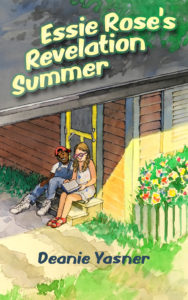Deanie Yasner, a former special education teacher, is the author of Essie Rose’s Revalation Summer (Golden Alley Press). Inspired by her own childhood, the novel is about ten-year-old Essie Rose Ginsberg, writer, loner, and all-time worrier, the only Jewish girl in Tipton, Mississippi in 1953. Her hopes for a happy-go-lucky summer vanish when she discovers a cryptic note left by Pearlie May Gibbs, the family’s housekeeper and Essie Rose’s one-and-only friend. I’m please to share my interview with Deanie.
Essie Rose’s Revelation Summer touches on some very serious issues – bullying, racism, antisemitism. Was it difficult to write about these topics while keeping the content appropriate for young readers?
What an interesting question! Surprisingly I’d have to say a resounding no for several reasons, all of which came together to make writing about these topics less difficult than I might have imagined.
First, I grew up in Mississippi, and as a very observant child, I became well aware of the rules and expectations necessary to survive in the Jim Crow climate. Essie Rose’s story was truly my story. Many of the experiences I witnessed have lingered in my consciousness to this very day. In retrospect I believe they provided a solid base for me to call upon in my writing of this book.
Secondly, I believe my many years in the field of education as a teacher and behavior specialist gave me a broad understanding of all areas of child development, including social, emotional and linguistic growth.
Thirdly, choosing to tell Essie Rose’s story via diary, using her 10-year-old voice, was the ideal format to write on the serious issues of bullying, racism, and antisemitism. Once I was fortunate enough to experience the writing miracle of being able to become Essie Rose as I wrote every single diary entry, everything came together.
One more thought – and you used the appropriate words “touches on” – I touched on these issues where they were essential for the reader to understand the times and setting where Essie Rose grew up and how they affected her life. But I wanted the story of her journey toward courage inspired by her love for her housekeeper, Pearlie May Gibbs, to take center stage.

The story is based on your own experiences growing up as a Jewish girl in Mississippi. Can you share a bit about the real people who inspired your characters?
The real person who inspired Essie Rose was in fact our family housekeeper, Delphia Gibbs. She truly was the one to whom I turned for comfort, support, and soul nurturing. As the story tells it, Essie Rose and Pearlie May were “two peas in a pod.” I remember Delphia’s beautiful singing voice. What I remember most is her innate wisdom which she imparted to me, and therefore to my protagonist. Her Half Dozen Words of Wisdom are alive and well.
The character of Moses Brownridge was inspired by LeRoy and Angelo, two African-American clerks who worked for my father. They became my friends and often my playmates when I visited the store. In my story they came alive once again through young Moses.

Because the story is historical, did you need to do any research? If so, did you discover anything surprising or unexpected?
I did an enormous amount of research for this project. As a writer of children’s books, I knew from the very beginning that this story had to be historically authentic in every way. It was my duty and utmost responsibility to give Pearlie May and Moses historically accurate voices. This means that outwardly, at least, they needed to appear to have complacency and lack of anger for the situation in which they had to exist. The consequences for them to do otherwise would have been dire. Even if that makes us uncomfortable now, that was the way of the time, and I felt it had to be portrayed with all honesty.
Since I lived through this terrible period in our American history, I relied upon my intimate knowledge of what life was like for both Jewish people and African-Americans living under Jim Crow laws. For confirmation that my memories were accurate, I communicated with people who had also lived in Mississippi during the era of segregation.
This research led to a surprise I shall never forget. To verify specific details, I connected with the local library in the actual town. To my astonishment, the receptionist asked if I would like to speak directly with the local historian. Of course, I said, absolutely. Lo and behold, when I gave the historian my first name, her reply brought tears to my eyes. Not only did she remember me, she remembered my parents by name. As she continued to relate stories about her Dave and Ethel, I listened with joy and gratitude. The writing journey does, indeed, bring unexpected and unforgettable miracles.
Tell me a bit about your journey as a writer and the path to publication for this book.
I suppose you might consider me a late bloomer. My serious writing began in my early 60s when I took my first on-line writing course. Happily, one of the assignments became a published story in Highlights Magazine. This was followed by another story published in Ladybug Magazine. During this time I read countless books on writing and studied with a coach as well.
I then embarked on my most ambitious project: a middle grade novel which I believe had been writing itself inside me for years. What began as a series of vignettes finally turned into a story written as Essie Rose’s writer’s notebook. After seven years of writing, re-writing, digging deep into the depth of my childhood emotions (some quite painful), feeling the pain of near-acceptances and outright rejections, I was blessed that my story found its perfect home with Nancy Sayre at Golden Alley Press. My final editing with her during the spring and summer of 2019 proved to be an exceptional experience. Working weekly to resolve specific issues and searching for the perfect word was challenging and exciting.
I would like to add the fact that I believe this story to be timeless. The issues Essie Rose faced in the 1950s are as rampant now as they were then. Her journey to courage can be an inspiration to readers that must face bullying, racism, and, unfortunately, increasing antisemitism. And Pearlie May Gibbs’ Half Dozen Words of Wisdom are truly words for the ages and sorely needed in our divisive and complex world.
Thank you, Deanie!
Learn more about Deanie here – DeanieYasner.com